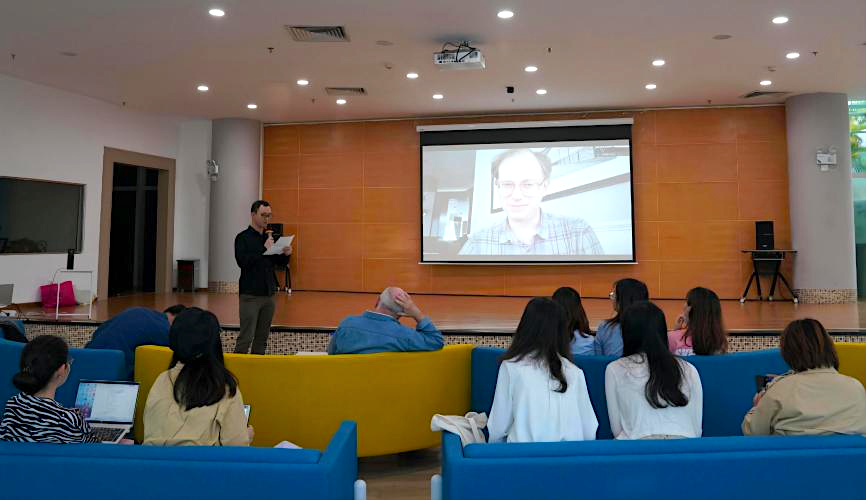On the evening of April 21st, the 8th Future Education International Salon, hosted by the Future Education Institute, was held in A101 of the Lijiao Building. The salon invited Dr. Mark Johnson from the University of Copenhagen to lead a discussion on the application of artificial intelligence technology in future education evaluation and the challenges faced by human beings around the theme of "Artificial Intelligence, Data Statistics, and Future Education Evaluation." Dr. Mark Johnson is a senior researcher in digital education at the University of Copenhagen, an honorary professor in the Department of Vision and Visual Science at the University of Liverpool, and the director and founder of the "Global Science Dialogue" course at the Far Eastern Federal University in Vladivostok. The event was hosted by Dr. Cui Xin, and more than 50 students and relevant teaching and research personnel from the institute participated both online and offline.

Firstly, Dr. Mark Johnson introduced the potential application of combining data statistics methods with artificial intelligence. He stated that currently, the application of data statistics methods combined with artificial intelligence technology, such as Convolutional Neural Networks (CNN), machine learning and image data classification technology, and Bayesian statistical techniques for data processing pioneered by Spiegelhalter and others, has achieved revolutionary breakthroughs. There is a wealth of evidence indicating that in some aspects, machine performance is gradually surpassing that of human experts. The combination of data statistics methods and artificial intelligence provides effective diagnostic solutions for some fields.
Dr. Mark Johnson then analyzed the challenges that artificial intelligence technology will face in educational evaluation. He stated that the biggest challenge currently is determining whether the results provided by machines are reliable. Artificial intelligence decision-making is based on models and algorithms, which may have errors. The effectiveness of artificial intelligence is usually measured by "sensitivity" and "specificity." Machine learning training cannot completely eliminate errors in deterministic judgments. A possible solution is to "rethink the nature of the predictions and probabilities generated by artificial intelligence." "Rather than predicting a student's academic performance with AI, it is better to predict the probability of correctness." This shift of artificial intelligence evaluation from predicting results to predicting "correct probability" may have a revolutionary impact on education.
Finally, Dr. Mark Johnson analyzed the areas in which humans and machines excel in future educational evaluation. He stated that the most basic issue in future educational evaluation is to clarify the areas in which humans and machines excel. Focusing human activities on areas in which they excel, such as cooperative judgment and handling uncertainty in evaluation, is important. At the same time, many evaluations do not require human participation, and allowing machines to perform operations is convenient, efficient, and accurate. This will improve evaluation efficiency, achieve automation, and enable students to evaluate their own learning situation based on the formative feedback generated by artificial intelligence.

During the free question and answer session, there was in-depth communication between teachers and students. Huang Sisi was concerned about the issue of bias in AI calculations, as AI is based on past data encoding programs. She consulted on how to avoid such problems that may arise in educational evaluation. Dr. Mark Johnson stated that the key is to let AI be used to discover uncertainty, rather than just providing simple solutions or conclusions. Sun Meng did not understand the significance of artificial intelligence for frontline teachers. Dr. Mark Johnson explained that the significance of artificial intelligence is that it can help teachers make decisions instead of replacing them, and AI can take care of simple tasks that consume a lot of time and energy, allowing teachers to engage in more creative work.

The salon event ended successfully with lively discussions.



 Last Page
Last Page

 Phone:0756-3621121
Phone:0756-3621121
 Email:ccie@bnu.edu.cn
Email:ccie@bnu.edu.cn